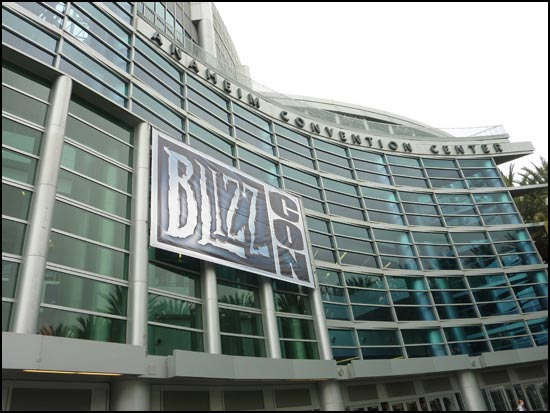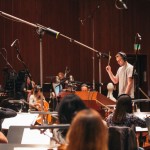This is the last piece we have from BlizzCon 2010. It’s not really about anything that the company has been up to, so I’ve been holding on to it. During our lengthy chat with Audio Director Russell Brower where we talked about StarCraft II, Diablo III, and World of Warcraft: Cataclysm, we also touched on the subject of context, as I thought he may have some interesting insights having worked on games with so much music that is loved by so many fans.
As it turned out, I was right. Aligning himself more with Wes’s “Everything is a Context” as opposed to Gideon’s “Context is Everything” argument, I think you may find what he has to say to be interesting.
Hit the jump for more.
The conversation about context came about when I mentioned the fact that the many World of Warcraft CDs and even the StarCraft II soundtrack that have been released since Brower’s arrival at Blizzard Entertainment have been true outside listening experiences as opposed to simple “cue dumps,” to which Brower noted:
“It’s an artistic choice that I think is kind of fun because the music has to exist now outside of the game, so I think it’s all fair to do some musical segue and group certain things together and given them a new name as group now. You might actually have 3 or 4 cues in one cut and give them a label, like “I, Mengsk” [from StarCraft II] for instance, and we do them all the time in World of Warcraft.”
This comment gave me a great window to ask Brower specifically about his thoughts on context, especially in regards to the fact that while I’ve never played World of Warcraft, I’ve always enjoyed the music, and more particularly, all the CD releases that have been created. I brought up both Gideon’s points and Wes’s points, noting my personal view that a soundtrack as a product should probably stand on its own if it’s being sold separately from the game. Brower had this to say:
“I think you’ve crystallized the role of the soundtrack in the product line: to present the music in a way that stands alone. That is the product at that point. It’s a listening experience that I hope people will put on in their car or iPod, or whatever, and as opposed to people who have pulled the MP3s out of the packs and put them in their iPod, and think, gosh, this is not the same feeling I remember from the game. Or if they play it for a third party who’s unfamiliar with the game, they may say, ‘Wow, this is kind of drone-y and boring!’ Well, because I wouldn’t put that on the soundtrack. It works great in the game, the drone-y boring stuff, it actually because atmospheric, and maybe you wouldn’t know the difference between the music and the ambience.”
Now, I admit that World of Warcraft is somewhat unique in that it’s the biggest MMORPG out there, and even more, there’s going to be 36 hours of music in the game with the arrival of Cataclysm, so the team is able to pick the most memorable music to put on the album. I proceeded to ask about soundtracks for games that only have 50 minutes of music, and are arranged in more of a “cue dump” or track-by-track fashion rather than a continuous listening experience as has been done at Blizzard Entertainment. Can we review and be critical of these kinds of soundtracks without knowing the context? Once again, Brower responded:
“Well, you bring up a couple of things. If it’s a good listening experience, I say go for it. But the other thing you’re bringing up is how long is the right length of a music product and what do you charge for it? There are no hard-fast rules. We kind of go on feels. We say, ‘That album feels short to me.’ In this digital age, you can buy things a track at a time. So you’re getting what you pay for, literally. Sometimes it’s cheaper to buy the whole album. If something is 20 or so tracks and it’s $10, then that’s a good deal. But if it’s something like we’d call an EP in the old days, and you charge per song, you just have to make a decision. Is it worth it? It may be about how you present it. If you present it as an EP and it’s $4, then you may say, ‘Hey, it’s short, but it’s only $4!'”
My final question was whether or not the fact that I had never played World of Warcraft made him view my reviews of his and the Blizzard Entertainment sound team’ s music differently.
“Well, you’ve reviewed the soundtracks. You didn’t review the game music. To make a distinction between somebody who say is reviewing the game and is mentioning the music–which is totally valid and cool–it’s different from what you’re doing. I see your readers as somebody who’s appreciating the products and albums. If they relate it to the game, it’s so much the better, but it’s still great.”
I suppose it helps that I usually have positive things to say, but still interesting thoughts nonetheless!
Do Russell Brower’s comments make you think about the debate differently? What are your thoughts on the context debate if you haven’t already weighed in?
Tags: Blizzard Entertainment, BlizzCon, BlizzCon 2010, Context Debate, Interviews, Russell Brower









































Well, it’s nice to have a little passive confirmation of my views. But more importantly, the distinction between ‘soundtrack’ and ‘game music’ really rings true — I’ve been implicit with it in my discussion, but never that clear (or crystallized, if you will).
I’ve been playing (yes, actually playing, Gideon!) two games lately that regular readers of OSV will recognise: God Eater and NieR. Naturally I was familiar with the music before doing so, but the way the music is used in both games is almost totally different to what you’d expect from the soundtrack experience alone.
God Eater uses bits and pieces of the tracks as it goes, per Russell’s discussion of several cues going into one ‘piece.’ A simple example would be the start of missions. You might hear the first ten or so bars of ‘An Approaching Nightmare’ or ‘Table of the Gods,’ but then nothing. You’re expecting the next part, which in both cases is an epic development, but all you get is footsteps and maybe a distant monster growling. And when you engage that monster, the rest of the tune kicks in. It’s almost like YOU have to do something, as the player, to get the rest of the music. I really, really like it.
In NieR, the tunes transition much more fluidly. I haven’t gotten that far into it, but there’s one early scene where a bard character (songstress, actually) is sitting at the fountain in the town. As you get closer to her, her voice (that of the awesome Emi Evans, whom we ‘met’ in Jayson’s top-notch interview) adds itself to the town music. Not when you talk to her, not even when you get all that close. It gives you this immediate sense that you might hear her singing from quite a ways away. And you would.
In contrast, another thing I’ve been playing: Castlevania — Lords of Shadow. Oh, musical controversy! No Yamane rock-tunes, no synthy pieces so clearly associated with Akumajou…but it’s a different game, isn’t it? God of the Colossus’s Fortune, to be perfectly crass about it. I’m not saying I don’t yearn for Bloody Tears or Simon’s Theme, but I am saying I’m not sure they’d fit with the massive scale of Lords of Shadow. Unlike God Eater and NieR, though, I don’t consider the music a massive plus-point and wouldn’t bother with the OST. On the other hand, it’s a better *game* than either of them.
Regarding Blizzard music, though. Hm. Hands up anyone who’s guilty of turning off pc game music in favour of their mp3s when playing online. Not a ‘luxury’ console games often offer. I loved the SC soundtrack. Played through the single player, left it on, as it was part of the narrative to me. Multi-player? You’re no longer constrained by the duration of the story being told. That music, no matter what, no matter how good it is (no matter the cost, hehehe), is going to get repetitive.
I imagine the same goes for MMORPGs — my only experience with which lately would be Guild Wars (mmo-ish) and even then I killed Soule’s music for my own after finishing each campaign.
…Loved the soundtrack to that too though. So that, to me, is the biggest distinction between ‘game music’ and a game’s ‘soundtrack.’ The soundtrack is designed to be listened to in a finite package (5-10 minutes per track, 60-70 mins per cd, etc), as a thing in and of itself. Game music might, but should not be expected to perform the same role. It complements the game, occasionally elevating it, rarely dragging it down.
Game music you can listen to independent of its source is pretty impressive stuff. On the other hand, if you find yourself doing that, maybe you’re already a step away from the standard gamer… 🙂
The argument of game music versus soundtrack is essentially splitting hairs. Yes, the experience is sometimes (not all of the time) tailored to be more “listenable” on soundtrack releases, but – again – what was the music written for? Was it written for a soundtrack release or was it written to score the action/game/film? If its the latter – which it usually is – I don’t feel the need to change my argument in the slightest.
With all due respect to Mr. Brower – whose music I obviously enjoy (check out my love letter, er, uh, review of StarCraft II) – I wonder if he’d feel differently about the discussion scoring a game like Enslaved or Bioshock that is a more level-based and linear experience, as opposed to the vast and more ambient MMO/multiplayer space. Obviously, the music in the latter has a slightly different role; a role that would probably need to be more tailored to the soundtrack release.
” If they relate it to the game, IT’S SO MUCH THE BETTER, but it’s still great.” [Emphasis mine]
Couldn’t have said it better myself. 🙂